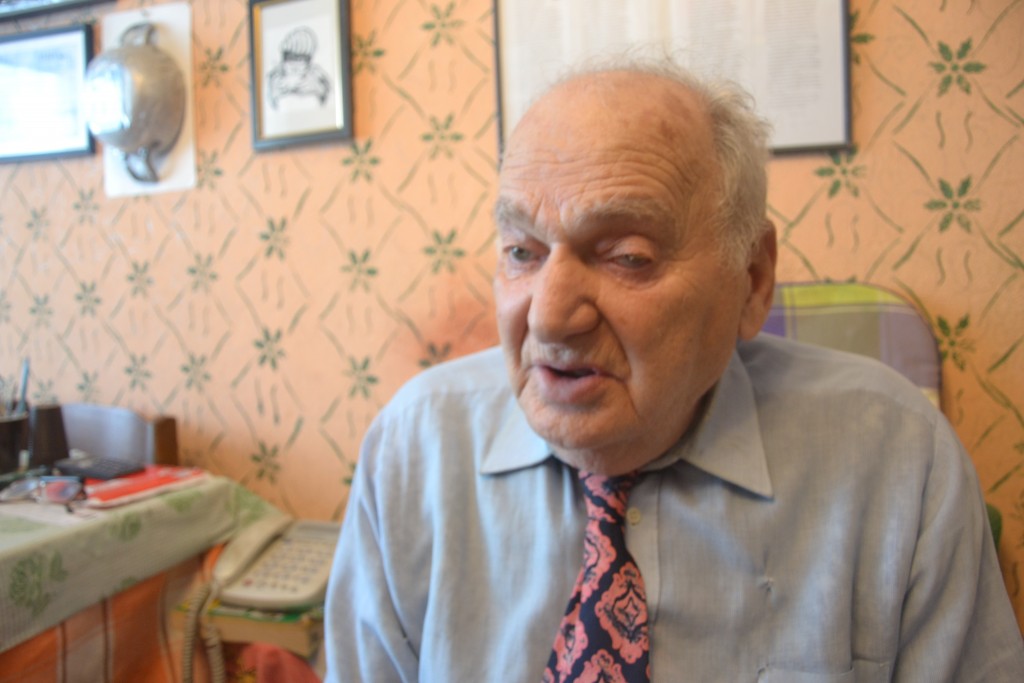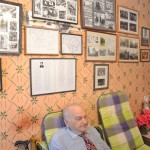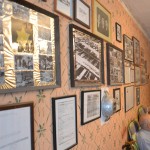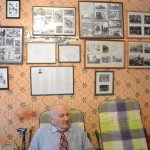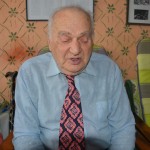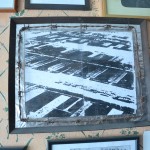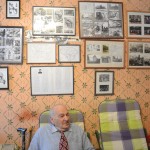Meyshe Preis, prisoner of three concentration camps
Lithuanian Jewish Community member Meyshe Preis (or Moisiejus Preisas, as his Lithuanian passport calls him) was imprisoned at three concentration camps: sent from the Kovna ghetto to Stuffhof, then to Auschwitz, then to Dachau. He’s alive and living in Sventsyan (Švenčionys), Lithuania, and still speaks about the horrors he survived in the ghetto and at the concentration and death camps. His apartment, where he now lives alone since the death of his beloved wife, has a wall dedicated to memorabilia from hell, including photographs and a small bowl he took with him to all the camps until his liberation by American troops from a forced march of prisoners from Dachau into the neighboring mountains in May of 1945. His wall museum, collected over many years, includes newspaper articles and written memoirs as well as photos. Currently the LJC Social Center is helping Meyshe Preis out around the house and with the simple chores of life.
He was born in Kovna (Kaunas) in 1930. His father owned a shop on President street where he sold different kinds of hats and fedoras he sewed with his own hands. The family lived in the wooden house where Meyshe Preis was born. He had three elder sisters, Dora, Ríve and Bérta. His mother Rokhl didn’t work outside the home, and took care of the family and the house. His sisters studied at university and the eldest, Dora, married in 1940. Their house had four rooms as well as one larger living room. They spoke Yiddish at home, but Meyshe and the rest of the family spoke Lithuanian fluently as well, and Meyshe attended a Lithuanian primary school near their home.
“My parents’ family was large, we got along well with our with uncles, aunts, cousins,” Meyshe recalls. “Our father supported the family, we had enough, and I remember how my sister liked to dress up. When she and her ‘boys’ went out to the restaurant, they always took me, too. [laughter] I still remember today the extraordinary aroma of the coffee and the cakes. Time passed this way. And then, suddenly, one day everything is ruined. In this photograph on the wall is our house, mom and sister, here is a piece of barbed wire from a concentration camp, and here is a photo of the concentration camp. I have collected everything over many years, I have forgotten nothing, I remember it all.
“The Germans hadn’t yet entered Kovna when the pogroms began, when the white armbanders began shooting Jews. I was only 11 when one beautiful June morning in Kovna men with white armbands entered our large courtyard. I knew one of them well, he was the oldest son of our yard keeper. His mother sat in the yard and peeled potatoes.”
***
“Do Jews live in this building?” the armed men asked.
Meyshe Preis used to talk to the younger son of the yard keeper, Albinas was his name, as he stood next to his mother peeling potatoes.
“No,” Albinas said. “They don’t live here.”
Meyshe Preis noticed a glance from the elder son of the yard keeper with the white band on his arm. The men turned around and left. That day the other Jews who lived and worked in that courtyard, where there was a print shop, a workshop that made soda pop and a place that made beds, were taken away and shot. Albinas on that occasion saved Meyshe and his entire family. Three days later, June 27, a second brutal pogrom began in Kovna at the Lietūkis garage.
***
“When the Germans came in 1941, they took the shop from my father and gave it to others. The war began and the Russian army fled. Jews didn’t have the right to go into stores or parks and we had to walk only in that part of the street where vehicles travelled. Albinas and I used to go into the shops and buy bread and potatoes. That’s how we survived. After a couple of months all Jews were ordered to appear in the ghetto established in Vilijampolė [Slobodka]. After this news was announced, we had to be ready within 24 hours. When we left the house, we still didn’t imagine we would never return. Our whole family settled into the last house on Miško street in the ghetto. There were several families there, 15 people, we slept on the floor, there wasn’t enough space. Father began to work in the factory, since they didn’t take working people into the ghetto [sic]. My sisters hid in the forests. About 40,000 people were driven into the Kovna ghetto. One night they murdered one and a half thousand, the next night about 2,300. And during the Children’s Aktion about 1,600 to 1,800 children aged 12 to 13 were murdered. During one mass murder operation I saw how they stabbed children with bayonets, smashed the heads of newborns on the floor and tore them in half. The brutality was blood-curdling.”
This time, too, Meyshe Preis managed to escape death. His mother fainted when she saw him coming back alive. He was almost caught soon afterwards, trying to smuggle parts for a weapon into the ghetto. That time the gate guard began yelling when he saw him, and the boy jumped into a ditch and hid the parts. The guard took him to the jail where there was no place to lie down or sit. They beat and tortured him, but Meyshe didn’t resist. Once the Germans told the children they were taking them to a health resort and put them in a wagon car. They took them to the Stutthoff concentration camp instead, where they were greeted by a pipe orchestra.
“We didn’t know where they had taken us. We walked a kilometer on foot. Whoever fell by the way was shot.” The selection began immediately. They separated the women. His mother and sister ended up in the other column while he struggled to remain among the adults where his father was. They were checking teeth, hand and feet to make sure they were fit. They were placed in the fourth barracks housing 200 children, supervised by the barracks kapo, a Pole named Jacek whom they called Krauger.
“We called him that because of his brutality and sadism. He beat the children up. The children were transported there from Lithuania, Hungary, Czechoslovakia and Poland, and included only 8 Jews. There was a red triangle patch on our shirts, meaning we were ‘political.’ I spoke Lithuanian well and no one knew I was a Jew. A priest who had come with them guarded the Polish children. His children were calmer and there were fewer conflicts among them, but he didn’t save them from being murdered, and he was murdered along with the Polish children. The Stutthoff guards were Ukrainians. The Germans only administered the camp. In the morning the prisoners were woken and ordered to crawl on all fours, to run, to jump, and we were beaten and ridiculed. A week later the children were put in vehicles and taken back to the train station.”
Meyshe Preis and the other boys were taken to Auschwitz where again they were met by an orchestra. There was the inscription “Arbeit macht frei” above the gates. The were forced to live in wooden stables. Auschwitz was the largest Nazi death factory in occupied Poland. Meyshe Preis was issued a number by which he was called. They confiscated his clothing and issued him what looked like pajamas to wear instead. Many were murdered immediately upon arrival at the camp, others died slow deaths of starvation and exhaustion. Meyshe Preis already knew the nature of the lurking danger and carefully observed his environment. He tried to use his fluency in Lithuanian to pass as a non-Jew. Observing once that a guard was taking down his number, he changed clothes with someone who had just died. The dead saved the living. In this manner he entered a different barracks. His work was now carrying stones up a hill.
A week later they put us back into the train cars and took us back to Stutthoff. That was 1943 or 1944, we didn’t know what day it was or what year it was. Again I was transported with adults for three days in a wagon without food or water.” He was taken next to a new camp being built in the Dachau complex of camps. The barracks were temporary and made of thin plywood. There weren’t any bunks and the prisoners were forced to sleep on the cold ground. The prisoners were made to build wooden barracks and three-tiered bunks. Meyshe Preis ended up in a work crew where he had to dip bricks into hot pitch and pull them out with his hands. The supervisor beat the prisoners and told them to work more quickly. The work was impossible, and Meyshe Preis decided to escape into a crew who loaded cement instead. He was barely able to lift the bags of cement in that work detail. It was winter in the mountains, everyone was hungry and all they had to wear were pajama tops. Meyshe Preis sought a way to change his job again. He joined a brigade involved with pouring cement through a net into a well. He worked the entire day in cement dust. Even the supervisors abandoned the site, the conditions were so awful. The skin was worn off his hands and the injuries festered. The scars remain upon his hands to this day.
“Hands with old scars. Touch them, have you ever felt such skin, after 70 years? I had to change jobs again. When they lined us up in lines of five people, I, a child, insinuated myself among the adults and went with them. I began working with a press which cut branches and again my hands were injured. The only good thing was I was working next to a barrel where the branches were burnt and which provided warmth. The officer was a real brutal bandit whom we feared, and he always walked around with a small shovel which he used to beat anyone he felt like, and he even used to break people’s skulls open. One time he went to the barrel to warm himself, and I became frightened, and began quickening the pace of my work. The blood began to drip from my hands more rapidly. The officer turned off the press and invited me over. All the prisoners who were in the immediate area had decided my end was near. He looked at my hands, grabbed the shirt off another prisoner, cut off a piece and bandaged my hands, then asked where I was from, since my sign was that of a political prisoner. I said I was from Kaunas, and lied that my father was a big factory owner. I had learned German by that point. He asked me what my surname was, since we were all without surnames. ‘Preis’ I said, to which he responded with surprise, saying that was his surname as well. He took me to the guard booth, gave me a bucket for carrying briquettes and wrote a note for me to pass freely.
“The Germans received loaves of bread, but they only ate the soft part and threw the crust away, which I collected and ate. I also used to cook them unpeeled potatoes, which they peeled, leaving the peels to me. I lived that way for a month, when suddenly I felt I no longer had the use of one leg. I could no longer work, and the crematorium beckoned to me. The officer took me into the booth, laid me under the bench and ordered me to lie there. The leftover food sufficed and I recovered. A week late the liquidation of the camp began. The first party of prisoners, 10,000 people, were led into the mountains and murdered there. A couple of days later we were lined up and marched 3 or 4 days at night towards the Tyrolean Alps, keeping us in the forest during the day. Once they marched us into a large pit and it began to snow. People froze and died. I lay down under a fir tree and covered myself with branches, and I felt something heating my legs, then I realized there was a fire burning next to me. In the morning they marched us, about a thousand people, onto a mountain road. All of a sudden we saw a tank with a white star and we weren’t sure whose it was. The guards disappeared. We ran in all directions. I entered a cellar full of straw and lay there for half a day. I saw soldiers were coming, they pulled me out and took me into a tent, and there were doctors there, and a kitchen, and everything smelled good and it was warm. They told me, me who was starving, not to eat right away, because I would die, and to begin eating very gradually.
“I realized I was now free! The Americans took us to Munich, to a Luftwaffe base, where we were reintroduced to beds and pillows. We slept. Some of the commanders found barrels of beer in the basement. A month later they registered us and issued us documents in four languages, instructing the commandants of the cities to provide us with lodging, food and travel expenses in order for us to reach our homes. I was supposed to reach Kaunas. The long trip began. I got lost once in a small German town where there was only a hospital, and I was looking for lodging, but ended up staying a month there, helping the doctors do their job and receiving food. In Berlin I crossed over into the Russian zone, where an officer asked who I was, but I didn’t know Russian, so we speak through a translator. I will not forget his question: ‘Why did you survive?’ Later, several years later, I understood I was considered an unreliable person in the Soviet Union because I had been in a concentration camp.
“I went part of the way to Vilnius on foot. I was 16. I slept at the station, waiting for a train to Kaunas, because they were only running once per week. A Vilna Jew noticed me and began a conversation with me, and once he understood I was Jewish he took me to a synagogue to sleep, and there I discovered lists detailing the fates of all the Jews. It turned out my entire family had been murdered. They provided me with papers and helped me get a job at a workshop on Vilnius street, and let me live in a small storage space. I really wanted to see my house in Kaunas. I went there. Nothing had changed. I knocked at the door. A woman opened the door and asked who I was. Once she found out she slammed the door. I tried to come again and I heard the old family clock chime the hour. They weren’t going to return a single item of my family’s things they had seized.” Meyshe Preis only managed to take this photograph of himself next to his family home, a photograph which he continues to cherish.
The Red Army arrived at Auschwitz on January 27 and found around 7,500 prisoners left alive. Soviet forces liberated Stutthof on May 9, 1945, rescuing about 100 prisoners who remained there despite the forced death marches which emptied the majority of the surviving population in the days leading up to liberation. These forced marches were the rule for concentration and death camps throughout the Third Reich in the weeks and days before liberation. Dachau, the first concentration camp opened by the Nazis five weeks after Adolf Hitler took power as German chancellor in 1933, had grown into an entire complex of satellite camps by 1945. Its main camp was liberated by the United States Army on April 29, 1945. US commanding general and future president Dwight Eisenhower issued a short statement regarding its capture the same day: “Our forces liberated and mopped up the infamous concentration camp at Dachau. Approximately 32,000 prisoners were liberated; 300 SS camp guards were quickly neutralized.”


